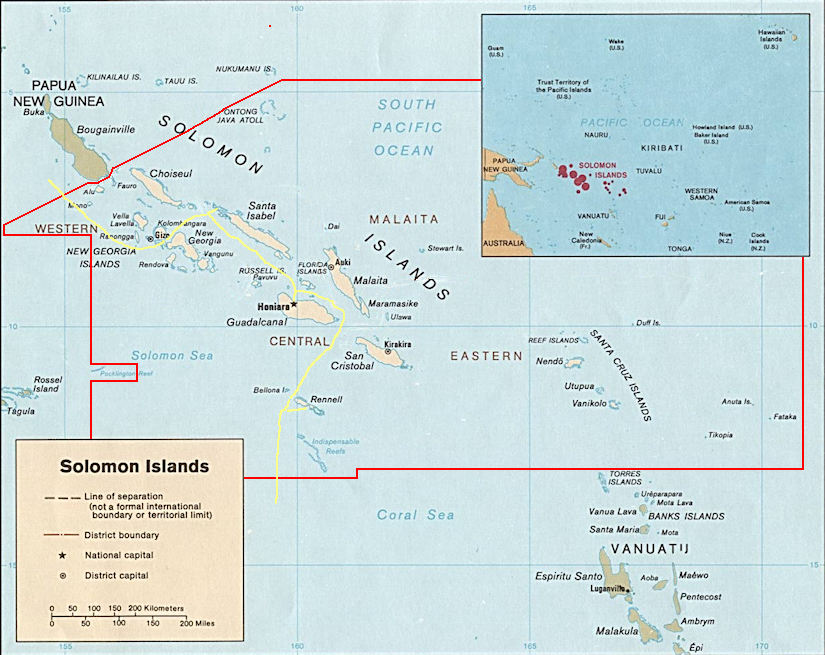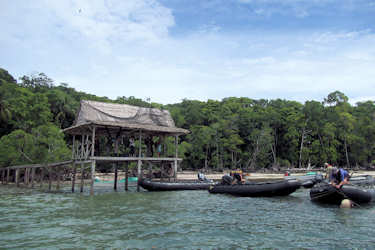Solomon Islands

Historie
It is believed that Papuan-speaking settlers began to arrive around 30.000 BC. Austronesian
speakers arrived c. 4000 BC also bringing cultural elements such as the outrigger canoe.
Between 1200 and 800 BC Austronesian Lapita people, arrived from the Bismarck Archipelago with their characteristic
ceramics. Evidence for their presence has been across the Solomon archipelago, as well at the Santa Cruz Islands in the south-east,
with different islands being settled at different times.
The first European to visit the islands was the Spanish navigator Álvaro de Mendaña de Neira, coming
from Peru in 1568; returning in 1595 to establish a settlement on Santa Cruz.
There was almost no further contact with Europeans until 1767, when British captain Philip Carter came upon Santa
Cruz and Malaita. British, French and American explorers followed, and whalers began arriving in 1798. Sandelwood
traders visited from the 1840s to late 1860s.
Missionaries began visiting the Solomons in the mid-19th century. They made little progress at first, because
"blackbirding"
(a synoniem for kidnapping people to work as slaves) led to a series of reprisals and
massacres.
From the 1860s, blackbirding ships in the Pacific sought workers to mine the guano deposits on the
Chincha Islands in Peru. In the 1870s, the blackbirding trade focused on supplying labourers to plantations,
particularly the sugar cane plantations of Queensland, Australia and the nation of Fiji.
The evils of the labour trade prompted the United Kingdom to declare a protectorate over the southern Solomons in
June 1893.
A proto-nationalist postwar movement called Marching Rule sprang up in Malaita, opposed to cooperate with the British
authorities, whose rule had been restored after WWII. Britain began to see the need for local government, and a govering council
was elected in 1970. The British Solomon Island Protectorate was renamed the Solomon Islands five years later and
independence was granted on 7 july 1978. The first Prime Minister was Sir Peter Kenilorea
Ethnic tensions started to fester; the Gwala people (people from Guadalcanal) resented the fact that there traditional land
was being settled by migrants from Malaita. Early in 1999, the inevitable happened. Civil War broke out, and hundreds died in
fighting.
Following mediation by Australia and New Zealand, The Townsville Peace Agreement was signed between the two fractions in october 2000.
However, what began as ethnic tension descended into general lawlessness. Though the conflict was confined to Guadalcanal, "events"
started happening elsewhere, including in the Western Province. The whole country was crippled and traumatised, and the fragile
economy collapsed.
On 24 july 2003, the RAMSI, an Australian-led coalition of police from Pacific Island states, was deployed throughout the whole
country to restore law and order.
However, this progress was seriously undermined in april 2006, when the election of controversial Snyder Rini as prime minister
resulted in two days of rioting in the streets of Honiara, despite the presence of RAMSI. Australia flew in reinforcements for the
RAMSI personnel, witch brought calm to the Solomon's capital. Rini eventually resigned before facing a motion of no-confidence in Parliament,
and Parliament elected Manasseh Sogavare as Prime Minister.
Sogavare struggled to assert his authority and was also hostile to the Australian presence in the country; after one failed attempt,
he was removed in no confidence vote in 2007 and replaced by Derek Sikua of the Solomon Islands Liberal Party.
Sikua lost the 2010 Solomon Islands general election to Danny Philip, though after a vote of no confidence in him following
allegations of corruption, Philip was ousted and replaced by Gordon Darcy Lilo.
Sogavare returned to power after the 2014 election, and oversaw the withdrawal of RAMSI forces from the country in 2017
I have visited the Solomon Islands in april 2015.
It was part of the West Pacific Odessey
On that trip i have seen
Rennel Island
Guadalcanal
Vakao Island
Kolombangara
Please let me know when you're having questions.
i would be pleased to help you.
Things to do and other tips
